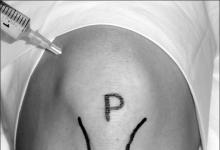Success of Stopping Depends on the Biologic Save

The type of biologic disease-modifying anti-rheumatic drug (DMARD) being used and remission duration were important factors predicting whether remission was maintained among patients with rheumatoid arthritis after cessation of the biologic, a Japanese study found.
Specific biologics associated with continued remission after withdrawal were the monoclonal antibody-type tumor necrosis factor (TNF) inhibitors, which included infliximab (Remicade), adalimumab (Humira), and golimumab (Simponi), and the CTLA-4 IgG fusion protein abatacept (Orencia), according to Motomu Hashimoto, MD, of Kyoto University, and colleagues.
Also independently associated with biologic-free remission were 6 months or more of remission before withdrawal, no glucocorticoid use at the time of withdrawal, and achievement of Boolean remission before stopping the biologic, the researchers reported online in Arthritis Research & Therapy.
Boolean remission, according to the American College of Rheumatology and the European League Against Rheumatism, was defined as tender and swollen joint counts of 1 or less, C-reactive protein level no higher than 1 mg/dL, and patient global assessment of 1 or less.
Remission, or at least low disease activity, today is a realistic goal for the majority of patients with early rheumatoid arthritis with the multiple available targeted therapies. Various studies to date have considered the possibility of stopping biologic treatment once remission is achieved, but the results of these previous studies cannot be compared because of differences in protocols.
Therefore, "it would be of clinical importance to determine which biologic DMARD is advantageous for achieving biologic-free remission and in what conditions biologic-free remission could be successfully maintained in daily clinical practice," Hashimoto and colleagues wrote.
To explore this in a real-world setting, they retrospectively analyzed data from the Kansai Consortium for Well-being of Rheumatic Disease Patients cohort from six Japanese universities, including 181 patients enrolled from 2011 to 2016.
Along with the three monoclonal antibody anti-TNF agents and abatacept, biologics used by patients in this cohort included the soluble TNF absorption molecule etanercept (Enbrel), the Fab fragment against TNF fused with polyethylene glycol certolizumab pegol (Cimzia), and the anti-interleukin 6 receptor inhibitor tocilizumab (Actemra).
Patients also were on conventional DMARDs, including methotrexate, sulfasalazine, and leflunomide, as well as prednisolone.
Remission was defined as a Disease Activity Score in 28 joints (DAS28) below 2.3, and biologic-free remission failure was defined as an increase in DAS28 above that score.
Among the patients included in the analysis, 95 were being treated with a TNF inhibitor monoclonal antibody, 32 with etanercept or certolizumab, 17 with abatacept, and 37 with tocilizumab. The patients' mean age was 49, and the majority were women. Disease duration averaged 7.6 years, and in two-thirds of patients, the treatment was their first biologic.
At the time of biologic withdrawal, 78.5% of patients were taking methotrexate, and 42.5% were on prednisolone. All remained on some type of treatment after stopping their biologic.
Maintenance of biologic-free remission rates were 21.5% at 1 year and 12.2% at 2 years. Median time until loss of remission was 70 days. A Kaplan-Meier analysis determined that the longest remission maintenance period was with the TNF inhibitor monoclonal antibodies.
In a univariate analysis, factors that were associated with a decreased risk of remission failure included disease duration of less than 2 years (HR 0.63, 95% CI 0.45-0.88, P=0.01), and having been biologics-naive (HR 0.56, 95% CI 0.40-0.79, P0.01). Having been in continuous remission for more than 6 months before discontinuation, having achieved Boolean remission, and the use and dosage of methotrexate were all associated with greater likelihood of maintaining remission.
On a multivariate analysis, factors not associated with remission failure included disease duration (HR 0.97, 95% CI 0.65-1.44, P=0.89), having been biologics-naive (HR 0.85, 95% CI 0.57-1.26, P=0.42), and methotrexate use at the time of discontinuation (HR 1.10, 95% CI 0.70-1.74, P=0.67).
In discussing their findings, the researchers explained that the greater efficacy seen with TNF inhibitor monoclonal antibodies may relate to the fact that these agents bind both soluble and transmembrane TNF-α, which "may not only neutralize soluble TNF but also inhibit the granuloma formation of TNF-expressing cells."
The rates of biologic-free remission seen in this study were lower than in previous studies, the team noted. For instance, in the HONOR study, remission was maintained for 6 months after discontinuation of adalimumab in 58% of patients, and in the C-OPERA trial, 42% of patients who discontinued certolizumab were still in remission at 1 year.
"The results of this study suggest that maintaining biologic-free remission after biologic DMARD discontinuation is more difficult in typical clinical practice than has been reported by clinical trials," Hashimoto and colleagues noted, explaining that contributory factors might include the presence of more comorbidities and longer disease duration than in clinical trials.
Limitations of the study, the researchers said, included its small size and retrospective nature.
The authors reported financial relationships with Mitsubishi-Tanabe, Chugai, Ayumi, UCB, Astellas, Eisai, Asahi-Kasei, AbbVie, Pfizer, Taishotoyama, Bristol-Myers Squibb, Eli Lilly Ono, Daiichi Sankyo, Takeda, Actelion, Sankyo, Merck Sharp & Dohme, Nippon Shinyaku, and Sanofi.









If you are a health practitioner, you may Login/Register to comment.
Due to the nature of these comment forums, only health practitioners are allowed to comment at this time.